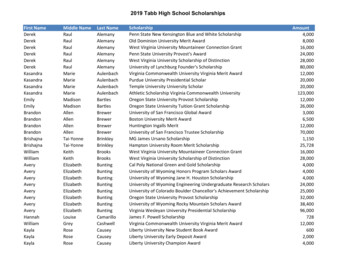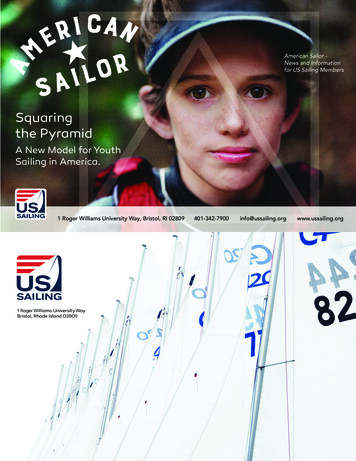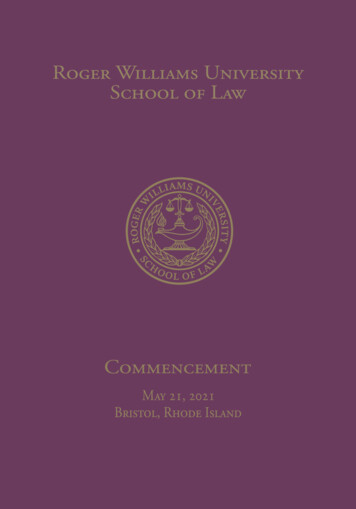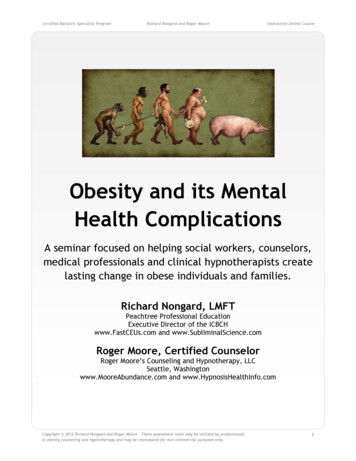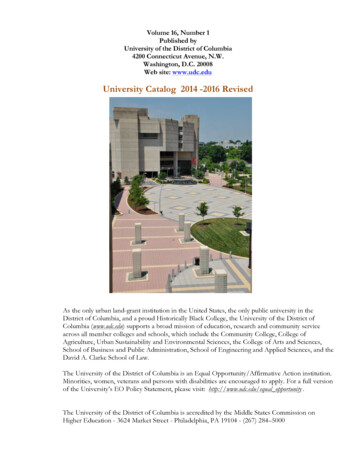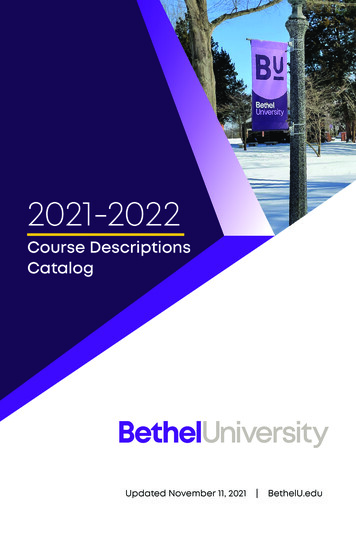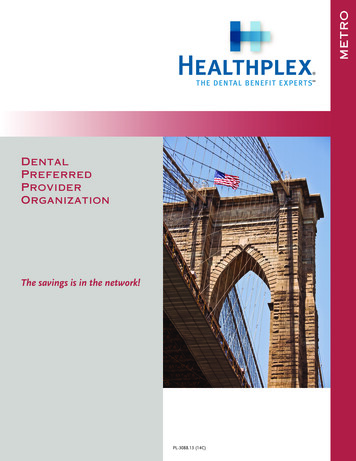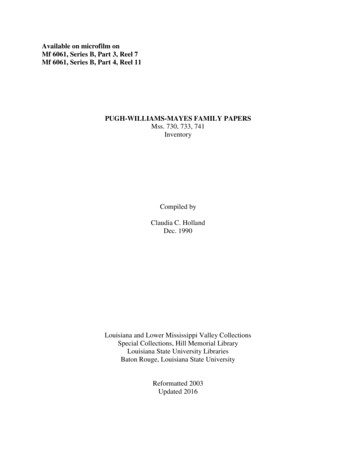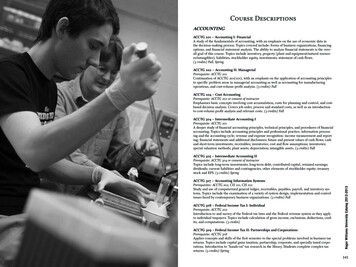
Transcription
Course DescriptionsACCOUNTINGACCTG 201 – Accounting I: FinancialA study of the fundamentals of accounting, with an emphasis on the use of economic data inthe decision-making process. Topics covered include: forms of business organizations, financingoptions, and financial statement analysis. The ability to analyze financial statements is the overall goal of this course. Topics include inventory, property (plant and equipment/natural resources/intangibles), liabilities, stockholder equity, investments, statement of cash flows.(3 credits) Fall, SpringACCTG 202 – Accounting II: ManagerialPrerequisite: ACCTG 201Continuation of ACCTG 201(101), with an emphasis on the application of accounting principlesto specific problem areas in managerial accounting as well as accounting for manufacturingoperations, and cost-volume-profit analysis. (3 credits) FallACCTG 204 – Cost AccountingPrerequisite: ACCTG 202 or consent of instructorEmphasizes basic concepts involving cost accumulation, costs for planning and control, and costbased decision analysis. Covers job order, process and standard costs, as well as an introductionto cost-volume-profit analysis and relevant costs. (3 credits) FallACCTG 304 – Intermediate Accounting IPrerequisite: ACCTG 201A deeper study of financial accounting principles, technical principles, and procedures of financialaccounting. Topics include accounting principles and professional practice; information processing and the accounting cycle; revenue and expense recognition: income measurement and reporting; financial statements and additional disclosures; future and present values of cash flows; cashand short-term investments; receivables; inventories; cost and flow assumptions; inventories;special valuation methods; plant assets; depreciation; intangible assets. (3 credits) FallRoger Williams University Catalog 2012-2013ACCTG 307 – Accounting Information SystemsPrerequisites: ACCTG 202, CIS 101, CIS 102Study and use of computerized general ledger, receivables, payables, payroll, and inventory systems. Topics include the examination of a variety of system design, implementation and controlissues faced by contemporary business organizations. (3 credits) FallACCTG 308 – Federal Income Tax I: IndividualPrerequisite: ACCTG 202Introduction to and survey of the Federal tax laws and the Federal revenue system as they applyto individual taxpayers. Topics include calculation of gross income, exclusions, deductions, credits, and computations. (3 credits)ACCTG 309 – Federal Income Tax II: Partnerships and CorporationsPrerequisite: ACCTG 308Applies concepts and skills of the first semester to the special problems involved in business taxreturns. Topics include capital gains taxation, partnership, corporate, and specially taxed corporations. Introduction to “hands-on” tax research in the library. Students complete complex taxreturns. (3 credits) SpringRoger Williams University Catalog 2012-2013ACCTG 305 – Intermediate Accounting IIPrerequisite: ACCTG 304 or consent of instructorTopics include long-term investments; long-term debt; contributed capital, retained earnings;dividends; current liabilities and contingencies, other elements of stockholder equity; treasurystock and EPS. (3 credits) Spring345
ACCTG 405 – AuditingPrerequisite: ACCTG 305Examines auditing theory and real-world practice. Topics include generally accepted auditingstandards, internal control, statistical sampling, as well as audit objectives, reporting and procedures. (3 credits) SpringACCTG 406 – Advanced AccountingPrerequisite: ACCTG 305Coverage of accounting for partnerships; introduction of the concepts of non-profit accounting, including governmental, schools, and other forms; fiduciary situations; business segments;installment sales; consignments; troubled debt restructuring; and corporate dissolutions.(3 credits) FallACCTG 430 – Special Topics in AccountingPrerequisite: Consent of instructorSelected topics in areas chosen by students in consultation with their instructor. This experienceis intended to provide an advanced level of course work or research in accounting. (3 credits)Special OfferingACCTG 469 Accounting CoopPrerequisites: Senior standing in accounting and consent of instructorDesigned to grant academic credit to students who work on a part-time basis in selected positions, usually without financial remuneration. Students may select from a wide variety of positions offered at local businesses, accounting firms, consulting firms, non-profit organizations,and government agencies. By arrangementAMERICAN STUDIESAMST 100 – Introduction to the American ExperienceFulfills a course requirement in the American Studies Core ConcentrationThis course will consider the American experience in its various forms, both past and presentwith an eye toward understanding the impact of the American diversity on individual membersof the community as well as the community’s impact on American life itself. It will considerthe American experience, taking into account both the diversifying and unifying aspects of theculture. This course will also offer an introduction to the American Studies content, theory andmethodology, with particular emphasis on the interdisciplinary nature of the field. (3 credits)Fall, SpringRoger Williams University Catalog 2012-2013346AMST 310 – Varieties of Religious ExperienceFulfills a course requirement in the American Studies Core ConcentrationExamines religious diversity within the United States and the variety of ways in which particularreligious orientations affect the behavior and personality of their adherents. Emphasizes spiritualaccounts and autobiographies as case studies for analyzing the influence of religion on ethnicand personal identities as well as on political and social behavior. (3 credits) Special OfferingAMST 314 – Popular CultureFulfills a course requirement in the American Studies Core ConcentrationThis course will explore the content and study of American Popular Culture. The focus will beprimarily on contemporary culture, but some reading and discussion will consider the popularculture of the past and speculate on the popular culture of the future as well. We will considerproduction, consumption and reception of various popular culture forms in an attempt to understand the impact and significance of popular culture in the lives of individuals and society as awhole. In addition to traditional academic texts, we will be using the popular culture artifactsAmerican Studiesthat surround us constantly as texts for consideration over the course of the semester. (3 credits)Special OfferingAMST 315 – Television in American CultureFulfills a course requirement in the American Studies Core ConcentrationThis course will explore the history of television and the impact of television on American history as well as its presence and significance in American life and culture. The development of television as a mass medium, its content and its reception by various audiences will be considered.There will also be some consideration of the television itself as a significant object in Americanlife. (3 credits) Special OfferingAMST 318 – Movies and Moviegoing in American CultureFulfills a course requirement in the American Studies Core ConcentrationAn examination of movies and the process of moviegoing in American life historically and inthe present. This course will consider the way the United States has been and is currently beingportrayed, to Americans as well as those outside the country, on film. A variety of genres will beconsidered as we endeavor to understand the way our culture is portrayed and the significanceof this portrayal in American history and its impact on contemporary life and culture. (3 credits)Special OfferingAMST 327 – The American MindFulfills a course requirement in the American Studies Core ConcentrationThis course will explore the impact of influential ideas and schools of thought on Americanculture and society. Individual writings by American thinkers as well as best-sellers may be examined in order to assess the historic continuity of key ideas and beliefs for American life. Bothideas themselves and their social impacts will be considered. (3 credits) Special OfferingAMST 331 – Culture and GenderFulfills a course requirement in the American Studies Core ConcentrationA cross-cultural analysis of gender expectations as these are articulated in different humansocieties. Focuses on the various views of human nature that organize social practices and theresulting differences in adult male/female relationships and in the assignment of temperament,activities, functions, status, and power. (3 credits) Special OfferingAMST 333: House and Home in AmericaFulfills a course requirement in the American Studies Core ConcentrationAmerican culture expresses beliefs and customs through the communities and shelters it creates.The suburban house and the suburb itself have become the archetypal symbols of the AmericanDream. Students gain insight into the relationship between their own beliefs/values about theshelters and communities they inhabit, and of how the American “Dream House” arises throughsynthesis of ideas from other cultures across time. (3 credits) Alternate YearsAMST 334 – Urban AmericaFulfills a course requirement in the American Studies Core ConcentrationUrban America seeks to explore the relationship between culture and environment. Unlike NewEngland, this course directs our attention to a specific type of environment, rather than to aregion of the country. Since at least the days of Thomas Jefferson, Americans have had a lovehate relationship with cities. Urban America explores this ambiguous attitude. It develops anunderstanding what a city is: how, as a made thing, it represents planning and thinking, and aesthetic values. Then it proceeds to look at ways individuals and groups have reacted to this uniquetype of environment. (3 credits) Special OfferingRoger Williams University Catalog 2012-2013Course Descriptions347
Course DescriptionsAMST 340 – Ethnic Cultures in AmericaFulfills a course requirement in the American Studies Core ConcentrationThis course will examine the development and impact of the ethnic cultures in the UnitedStates. There will be an historical component of the course as we consider how the currentarray of ethnic cultures in the U.S. developed, but the majority of the course will be focusedon contemporary ethnic cultures in America as well as the collective impact of “the ethnic” onAmericans and American culture in general. (3 credits) Special OfferingAMST 345 – Education in American CultureFulfills a course requirement in the American Studies Core ConcentrationThis course will explore the development of education in the United States and the impact it hashad on Americans and American culture. Topics considered will include the American publicschool system and responses to it, higher education, and other grass – roots educational institutions such as the Chautauqua movement. Course will consider both past and present incarnations of education in American, but the impact of schools and schooling on the individual andthe society will be the focus. (3 credits) Special OfferingAMST 350 – Experience of RaceFulfills a course requirement in the American Studies Core ConcentrationComparative study of the experiences, identities, and inner worlds of Native Americans andAfrican Americans in the United States. Focuses on 19th and 20th century literary expressions ofthese two groups. (3 credits) Special OfferingRoger Williams University Catalog 2012-2013348AMST 355 – Class and CultureFulfills a course requirement in the American Studies Core ConcentrationUsing literature and the arts, as well as analytical studies, Class and Culture investigates theimpact of social class on the lives of Americans across the United States. It complements otherstudies of American diversity, recognizing that one’s social class interacts with race and genderand these both modify one’s expectations and the way one perceives members of the other socialclasses. It also explores the way demographic distribution influences our knowledge of socialclasses other than our own. (3 credits) Special OfferingAMST 360 – Southwestern CulturesFulfills a course requirement in the American Studies Core ConcentrationIntroduction to the relationship between region and culture through a study of selected works ofAmerican, English, Hispanic, and Native American authors who have lived in the New Mexicoarea. (3 credits) SpringAMST 430 – Topics in American StudiesForum for experimenting with new ideas, topics, and themes; topics or themes developed andstudied by interested majors in conjunction with faculty. (3 credits) Special OfferingANTHROPOLOGYANTH 100 – Introduction to Cultural AnthropologyFulfills a course requirement in the Anthropology Sociology Core ConcentrationFulfills a course requirement in the Graphic Design Core ConcentrationCultural Anthropology examines the diversity of beliefs, values, structures and practices in thevast range of human social life in the contemporary world. This course introduces the principalconcepts, methods and ethics that anthropologists employ to study culture and cross-culturaldiversity by engaging ethnographic case studies, films and practical research exercises. Specifictopics may include economic adaptation, political organization, kinship, gender, ethnicity, language, art religion and issues in applied anthropology. (3 credits) Fall, SpringANTH 200 – Native North AmericansFulfills a course requirement in the Anthropology Sociology Core ConcentrationPrerequisite: ANTH 100A survey of native North American peoples. One group from each of the ten subculture areas isconsidered ethnographically. Topics may include Kwakiuti of the Northwest Coast, the Cheyenneof the Plains and the Iroquois of the Eastern Woodlands. The course introduces contemporarysocial problems related to the reservation system and urban migration. (3 credits) Fall, SpringANTH 205 - Religious Diversity in Global PerspectivesFulfills a course requirement in the Anthropology Sociology Core Concentration.This course is a cross-cultural exploration of religious belief, myth, and ritual. The course emphasizes anthropological research and perspectives, but also draws on interdisciplinary sources.Specific topics include the origins and functions of religion in society, diverse interpretations ofthe supernatural, the symbolic meanings of myth and ritual, the roles of religious specialists, andreligious experience. Assignments examine religious belief and practice within particular cultural contexts as well as in comparison to other cultures in the global context. (3 Credits) FallANTH 212 – Studies in AnthropologyFulfills a course requirement in the Anthropology Sociology Core ConcentrationPrerequisite: ANTH 100Field methods: offered in conjunction with pre-approved study abroad programs. Emphasizesmethodologies for collecting data. (3 credits) Special OfferingANTH 220 – Self, Culture and SocietyFulfills a course requirement in the Anthropology Sociology Core ConcentrationPrerequisite: ANTH 100Study of the role of culture in the formation of personality and the problems of individual adjustments to the demands of culture. (3 credits) FallANTH 222 – Environmental AnthropologyFulfills a course requirement in the Anthropology Sociology Core ConcentrationPrerequisite: ANTH 100Explores the principles through which non-human environments shape human cultures and cultures in turn affect their environments. Students will become familiar with how a range of societies comes into relation with their environments both through their material transformationsof ecosystems and the ideological and symbolic frameworks through which peoples envisionhuman-nature interactions. Topics will include indigenous environmental knowledge, sustainable development, interspecies relations, environmental governance regimes, gender relations,and the global environmental movement. (3 credits) Alternate FallRoger Williams University Catalog 2012-2013AMST 335 – New EnglandFulfills a course requirement in the American Studies Core ConcentrationHistory and culture of the New England region examining the varieties of New England life fromcolonial Plymouth to modern Boston, as well as the continuities of New England tradition ineducation, religion, seafaring, and milling. (3 credits) Special OfferingAnthropology349
Roger Williams University Catalog 2012-2013350AnthropologyANTH 230 – Political AnthropologyFulfills a course requirement in the Anthropology Sociology Core ConcentrationPrerequisite: ANTH 100An overview of questions of power and politics through an anthropological perspective, withspecial attention on inequality and violence in the non –Western world. Anthropologists havelong been concerned with how different cultures organize themselves politically; in this course,we build from classical topics towards an investigation of how differences in power and politicalinequalities manifest themselves in the daily lives of people throughout the world. The coursematerial blends a broad range of theoretical approaches to studying power with the close detailof ethnographic case studies. (3 credits) SpringANTH 300 – Reading EthnographiesFulfills a course requirement in the Anthropology Sociology Core ConcentrationPrerequisite: ANTH 100Ethnography has always been the distinctive characteristic of cultural and social anthropology.The focus of this class will be on reading ethnographies to learn about different types of ethnography, as well as explore the writing process for ethnography. It is a seminar style course whichwill raise questions concerning research, writing, data collection, ethics, the role of researcher,effects on the researched community and contributions to the professional field. The classwill include relevant analytical experiences based on reading, research, and writing (3 credits)Alternate FallANTH 240 – EthnologyFulfills a course requirement in the Anthropology Sociology Core ConcentrationPrerequisite: ANTH 100Ethnology is a study of human cultures from a comparative perspective. This course surveysglobal diversity by examining cultural differences and similarities in a variety of societies acrossthe world. Through systematic cross-cultural comparisons of specific dimensions of society (e.g.family structure, gender roles) students will gain an understanding of the role culture plays inshaping human thought, behavior and social organization. (3 credits) Special OfferingANTH 310 – Applied AnthropologyFulfills a course requirement in the Anthropology Sociology Core ConcentrationPrerequisite: ANTH 100This course focuses on the advocacy and intervention components of anthropology. Students willenhance their assessment skills through an in-depth analysis of problems and solutions for particular cultures. Readings will address issues such as identifying local needs, promoting culturallyappropriate responses to change, and protecting the rights of marginalized people. (3 credits)Alternate SpringANTH 244 - The Anthropology of SportPrerequisite: ANTH 100 or consent of instructor.Fulfills a course requirement in the Anthropology Sociology Core ConcentrationThis course is an introduction to anthropology of sport. In the first third of the course studentswill learn about history of the anthropology of sport and see how each of five subfields of anthropology examines sport. During the rest of the course students will examine a variety of case studies through books and films, not only about North American sports and culture but also outsideour borders, including Europe, South America and Asia. (3 credits) Fall.ANTH 351 - Cultures of Latin AmericaPrerequisite: Fulfills a course requirement in the Anthropology Sociology Core Concentration.Prerequisite: ANTH 100This course introduces students to anthropological work on and ethnographic practice in LatinAmerica. It covers a wide range of topics and aims to provide a solid background to the array ofanalytical perspectives anthropologists have drawn upon in their scholarly engagement with theregion. Course includes a broad historical overview of the cultural and historical diversity of theregion, as well as contemporary case studies of cultural transformations within specific countries. (3 credits) Spring, Alternate YearsANTH 260 – The Anthropological LensFulfills a course requirement in the Anthropology Sociology Core ConcentrationPrerequisite: ANTH 100How do anthropologists investigate culture? What makes anthropology unique as a social science? The aim of this course is to provide an overview of perspectives and trends in culturaland social anthropology. Students will be introduced to some of the major theories that inspireand inform anthropological analysis and discover what makes anthropology distinctive amongthe social sciences. While the course is historical and chronological in organization, our centralconcern will be with how anthropologists have defined the field, the kinds of questions they haveasked, and the methods used to attempt to answer those questions. (3 credits) Fall, SpringANTH 270 – Global HealthFulfills a course requirement in the Anthropology Sociology Core ConcentrationFulfills a course requirement in the Public Health minorPrerequisite: ANTH 100The public health subfield of Global Health examines illnesses that affect human populationsacross national boundaries. This course introduces the subfield and emphasizes social scienceperspectives on the social, cultural, and political-economic forces that influence global healthproblems. Specific topics include longstanding health problems such as malaria and tuberculosisas well developing issues such as emerging infectious diseases and climate change. (3 Credits)SpringANTH 299 – Special Topics in AnthropologyPrerequisite: ANTH 100Examines topics from the subfields of cultural anthropology. Initiated by student demand, interest of instructor, or timelines of offering. (3 credits) Special OfferingANTH 356 – World CulturesFulfills a course requirement in the Anthropology Sociology Core ConcentrationPrerequisite: ANTH 100Survey of world cultures designed to develop understanding of the ways in which diverse peoplearound the world view their own worlds. Focus will depend on faculty expertise and studentinterest. (3 credits) Alternate SpringANTH 370 – Medical AnthropologyFulfills a course requirement in the Anthropology Sociology Core ConcentrationPrerequisite: ANTH 100; recommended SOC 300.This course examines the ways that culture shapes the meaning of health and illness in everydaylife by engaging the study of Medical Anthropology. This vast subfield of cultural anthropologyencompasses the investigations of the cultural construction of health and illness, mind-bodyinteraction, the social relations of healing, and the political-economy of health care, among othermore specific topics. The course material merges theoretical and applied approaches to exploreresearch of both Western biomedical and non-western medical traditions as they shape diagnosis,treatment and the experience of suffering. Assignments incorporate instruction in the qualitativemethods used in this subfield of cultural anthropology. (3 credits) Alternate YearsANTH 380 – Culture Change and DevelopmentFulfills a course requirement in the Anthropology Sociology Core ConcentrationPrerequisites: ANTH 100Focuses on change that is inherent in all cultures. This course will examine how anthropologistshave explained the ways cultures change, by theorizing, for example, processes of evolution, dif-Roger Williams University Catalog 2012-2013Course Descriptions351
fusion, and domination, and addressing the long-term positive and negative implications.(3 credits) Alternate Fallthe communication and design skills acquired in this course will be applicable to a wide varietyof not-for-profit environmental and educational organizations. (3 credits) SpringANTH 430 – Special TopicsFulfills a course requirement in the Anthropology Sociology Core ConcentrationPrerequisites: ANTH 100Study of special topics in anthropology. Topics determined by student needs and the availabilityof appropriate instruction. (3 credits) Special OfferingAQS 314 – Field Collection Methods (Bahamas)This three credit course is organized as a ten day off-campus program offered through the NewEngland Aquarium. Each Spring, the Aquarium organizes a field identification and collecting tripto Cay Sal bank in the Bahamas. For this course, the trip will be timed to coincide with the RWUSpring Break, and one of the RWU Faulty will accompany the students. Up to 15 students cansign up to work alongside Aquarium professionals as the collect and identify reef fish and invertebrates. The trip includes accommodations and up to 5 dives/day abroad the R/V Coral ReefII, meals and beverages, and a dive in the Aquarium’s Giant Ocean Tank. Students will increasetheir fish identification skills, learn about conservation efforts in the Bahamas, and participate inon-going reef conservation studies. (3 credits) SpringANTH 454 – Qualitative MethodsPrerequisites: ANTH 260 ( C- or higher ) and SOC 260; ( C- or higher); Open to Anthropology Sociology majors; senior standing or consent of instructorAn overview of anthropological and sociological research methods. Provides an introduction toresearch design beginning with the concepts and principles of social research. Includes instruction in the development of research questions, sampling, measurement validity and reliability,hypothesis testing, and data collection and analysis with an emphasis on ethnographic techniques. Students will engage in fieldwork as part of the requirements for this class. (3 credits) FallANTH 460/SOC 460 – Senior SeminarCross-Listed as SOC 460Prerequisite: ANTH 454 (C- or higher)This course is designed to foster a deeper understanding of anthropology and sociology. Studentswill be required to produce research suitable for presentation at a student-research conferenceand/or publication in either anthropology or sociology student-level research journals. Topics willbe determined by the expertise of the instructor and student interest. (3 credits) SpringAQUACULTURE AND AQUARIUM SCIENCEAQS 260 – Principles of Aquatic Animal Husbandry and LabA survey of the captive fish and invertebrates encountered in the trade of marine ornamentalsand the conservation issues surrounding their use. Care and Maintenance focusing on the compatibility, propagation potential, captive breeding, culture challenges and advancements in technology will be examined. Course will cover important aspects of species acquisition, collectionand transfer, as well as special husbandry needs of selected organisms. The laboratory will focusaquatic animal health issues as they relate to holding animals in captivity. (4 credits) FallRoger Williams University Catalog 2012-2013352Aquaculture and Aquarium ScienceAQS 262 – Aquarium System Design and Life Support and LabThere is a strong and broad-based need from many education, research and commercial organizations for information on the planning, design, construction and operation of seawater systems.Unfortunately, an understanding of biology or engineering alone is not likely to result in a practical, working system design. Biologists generally do not understand the mechanical and hydraulicaspects of design, while engineers do not typically appreciated the biological considerations. Thiscourse is intended to provide the technical knowledge and practical experience that will enablestudents to design successful systems on a variety of scales. Lecture portion will focus on designissues, while laboratory will concentrate on water quality and toxicity as part of the need to provide life support to seawater systems. (4 credits) SpringAQS 306 – Principles of Museum Exhibit DevelopmentThis course will introduce students to the basic aspects of successful exhibit design and methodsfor conveying educational information to the general public in an aquarium or museum setting.The course will include an introduction to commonly used materials and techniques; the incorporation of good graphic design; and the distillation of educational concepts into interesting andinformative materials. This course will be led by the design team at the New England Aquarium,and will involve the creation of exhibits for actual use in a public setting. It is anticipated thatAQS 346 – Principles of Hatchery Management and LabThe aquaculture industry relies on hatcheries – production facilities that nurture young aquaticorganisms to the point where their survival is assured. Hatcheries include facilities dedicatedto the production of almost any fresh or saltwater aquatic species including: shellfish, tropicalmarine fish, trout, abalone, and seaweed. This course is intended to support an education inaquaculture and give students practical experience in the operation of all aspects of hatchery.The content of this course will depend on the instructor, but will focus on either shellfish ormarine ornamental production as these are the two main production facilities that currentlyoperated at the university. This course will be very hands-on and include important aspects ofanimal husbandry and production. (4 credits) SpringAQS 352 – Public Aquarium ManagementThis course will instruct students in all aspects of the management of a large public aquariumfacility. This includes how to maintain a healthy life support system for display organisms aswell as an overview of the management of staff, interns and volunteers, financial considerations,corporate structure, regulatory requirements, permitting, marketing and all aspects of operatinga large not-for-profit organization. This will be accomplished through examination of the operations and management structure of the New England Aquarium and
Roger Williams University Catalog 2012-2013 Roger Williams University Catalog 2012-2013 345 Course Descriptions ACCOUNTING ACCTG 201 - Accounting I: Financial A study of the fundamentals of accounting, with an emphasis on the use of economic data in the decision-making process. Topics covered include: forms of business organizations, financing

